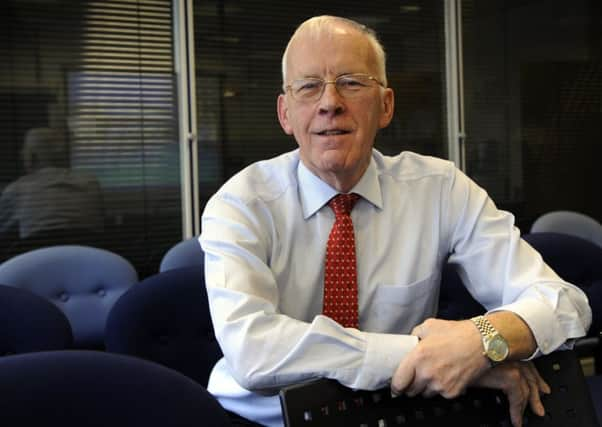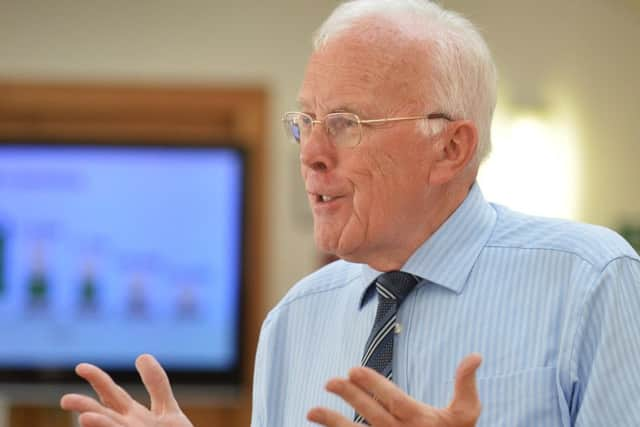Sir Ian Wood: Why I’ll never have a private jet


He may be invited to gatherings of the world’s greatest givers and rank high on all the rich lists, but the Aberdonian oil tycoon doesn’t really see himself like that.
Sir Ian jokes that when he attended The Giving Pledge in Virginia – an elite philanthropy conference led by Microsoft founder Bill Gates and American industrialist Warren Buffett – he was likely the only one without a private plane, and probably the poorest one on the guest list.
Advertisement
Hide AdAdvertisement
Hide AdAt the age of 73, he still works seven days a week, despite “retiring” in 2012 as chairman of the Wood Group, one of the greatest success stories of the North Sea oil boom.


You wish he would just give himself a break and go and enjoy some Sir Ian time.
But he gives the clear impression that there is always something more to be done, something else to worry about – and something else to get right. This is now particularly true of The Wood Foundation, the trust set up by his family which by the end of 2014 had channelled £16m both into good causes in Scotland and Sub-Saharan Africa, with significant commitments lined up for this year.
His address at the Virginia conference was to encourage the largely American audience to consider donating less to the universities, schools, churches and other homegrown institutions and look overseas to make the biggest possible impact with their dollars.
It was an approach he says that was agreed beforehand with Gates, who now focuses his time on trying to rid Africa of polio.
After just 30 hours at the gathering, Sir Ian says he has no idea what effect his thesis may have had – but he does plan to go back next year to find out: “It was a fascinating conference.
“There were some very, very clever and very able people there, some very admirable people there and some very interesting egos there too,” he says.
“You hope people are going to listen to what you said and think about it. I will probably try and go back next year and see just what has happened.”Does Sir Ian think he will have a private jet by then? “No. I will never have a private jet,” he says with a laugh.
Advertisement
Hide AdAdvertisement
Hide AdHe adds: “Listen, wealth is only worth what you do with it. You only need a certain amount of wealth to live a reasonable life so wealth in some ways becomes a responsibility,
“One of the things I have tried to get across to conference is that it is seen as a kind of a billionaires’ club. I am just utterly against that. There are people doing philanthropic things with £250 or £1,000 or indeed giving their life to causes, which is worth a hell of a lot more than just giving wealth away.”
Some game-changing outlays by the Wood Foundation include the purchase of two tea factories in Rwanda and Tanzania which have helped to improve the livelihoods of around 50,000 smallholders, with Sir Ian’s staff also lobbying to bring in legislation to protect the price paid to the growers.
In Aberdeen, he donated £10m to build a multi-storey car park at Aberdeen Royal Infirmary after his own family experienced the stress of trying to find a space during visiting time.
He is immensely proud of his Youth and Philanthropy Initiative, which promotes citizenship, entrepreneurship and charity work to pupils in about 190 schools.
However, Sir Ian says he didn’t become involved in philanthropy for the feel-good factor, but because of his gnawing concerns about global inequalities which had built up over the years:“You get to enjoy all the opportunities of being part of an international business but you can’t escape the fact that all sorts of responsibilities must go with that.
“It does sound corny but its absolutely true: I wanted to put something back. If Rabbie Burns said ‘to see ourselves as others see us’, then the mirror image of that is to see others as we see ourselves, to look at other people and think ‘well that could be me’.”
Sir Ian is speaking from his Aberdeen office, which is in the nice bit of town but hardly flash. There are stacks of papers lined up against the wall and around his desk. In the corner there is a giant cheque for £150,000 which he is due to deliver to a children’s appeal that afternoon. On the walls and windowsills there are family photos and pictures from an Africa safari holiday.
Advertisement
Hide AdAdvertisement
Hide AdIn 2009, when he arrived in Sub-Saharan Africa with the foundation, he was met by“tens of thousands” of tea growers who had been handed plots down through their families. With no real expertise, they were paid a “very poor price” for their crops. He said the foundation’s work to help them had been met with “huge suspicion” from the smallholders and the co-operatives but progress over the past two years had been “very satisfying”.
Would he be as keen to spend on some of the symptoms of poverty and inequality as much as the long-term treatment of the causes? Would Sir Ian, lauded philanthropist, put 50p in the cup of a street beggar?
A pause, then: “The answer is I generally do give to someone on the street but then I walk on – then wonder what he or she is going to do with it. Then I worry if I have done the right thing.”
Has he felt that his wealth has become a burden, that it has come to define him?
Sir Ian said: “I don’t think money has bought me happiness or unhappiness. I understand why people who don’t have it think that it does. But it comes from your personality, your marriage, your relationships with others. Happiness comes from much more important things than money.”